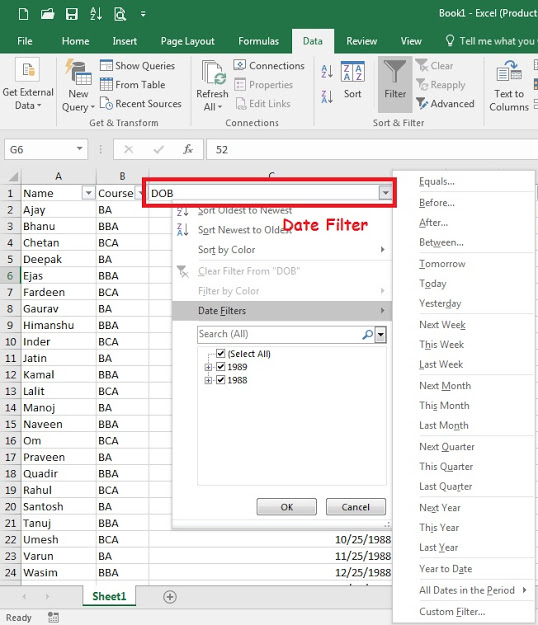Excel is a tool for data analysis and calculations. For better use of analyzing data we use many features and out of these features, the filter is one of the most important and most used tools. A filter helps to extract
certain data out of the given data. This data can be categorized in any form like,
text, number, date or fill color. The use of filters in Excel plays an important
role whenever we want to extract certain information from different fields of
data.
The data used for filter must have the given details to apply
filter and use them properly: -
·
The data must have first-row mentioning the title of
the columns, these titles work as a field name.
·
Every column must have data of the same type,
i.e. either text, date (with proper date format – mm/dd/yyyy or similar as per
your system format), or number.
·
There must not be any gaps in the rows/blank
rows, else filter is not applied to the rows appears after blank rows.
How to apply a filter to the data?
To apply a filter to the data, we must select the data first,
or we can simply click anywhere in the data and then select any one option
mentioned below: -
1.
Home
Tab -> Editing Group -> Sort & Filter Option -> Filter
2. Or, Data Tab -> Sort & Filter Group -> Filter
3.
Or even we can use short cuts like
a.
Ctrl + Shift + L (for versions above 2003)
b.
Or even, Alt + D, then F then again F (for all
versions)
As I told you, columns of data are divided into text, date
or number formats, filters are applied in the same format at the heading of the table.
Text Filter
Text Filter helps in selecting/deselecting checkmarks from
the list and pick only selected item(s) to show in data. We can also apply
selection filters based on the order of value related to given constraints
like, Equals, Does Not Equal, Begins With, Ends With, Contains, Does Not
Contain, etc.
Date Filter
Date Filter helps in selecting/deselecting checkmarks from
the list and pick only selected item(s) to show in data. We can also apply
selection filters based on the order of value related to given constraints
like, Equals, before, after, between, Day wise (today, tomorrow, yesterday),
week wise (next week, this week, last week), Quarter-wise (next quarter, this
quarter, last quarter), Year wise (next year, this year, last year), etc.
Number Filter
Number Filter helps in selecting/deselecting check marks
from the list and pick only selected item(s) to show in data. We can also apply
selection filters based on the order of value related to given constraints
like, equals, does not equal, greater than, greater than or equals to, less
then, less than or equals to, between, top 10, above average, below average,
etc.
Every drop-down arrow at the filter heading can be opened in
further two ways: -
1.
Click by mouse/touchpad
2.
Selecting the heading cell and then press (Alt +
Down arrow)
Note: you can even select/deselect check marks with
keyboard using the space bar.
Color Filter
A color filter is applied to those records which are marked
out by applying foreground color or background color or both by selecting rows.
This type of filter is visible in all types of filters (text, date or number),
this comes under the option, “Filter By Color”
Removing Filters
To remove the filter from any field, you can click on the option “Clear
filter from – FieldName”. This option is visible in all drop-down of every
filtered column heading.
I hope this small step by step instruction will help you
understand filters easily. I have mentioned both ways of applying filters,
using tab options, and also short cut. Do tell me in the comment section, which
option suits you best and why.
If you like the content, also comment about that and encourage
me to write more topics related to excel.
If you want to learn by reading a book you can also buy this book. This is my recommendation.





Comments
Post a Comment
If you want to share your queries or suggestion, please let me know to help you better.
Please do not enter any spam link in the comment box.